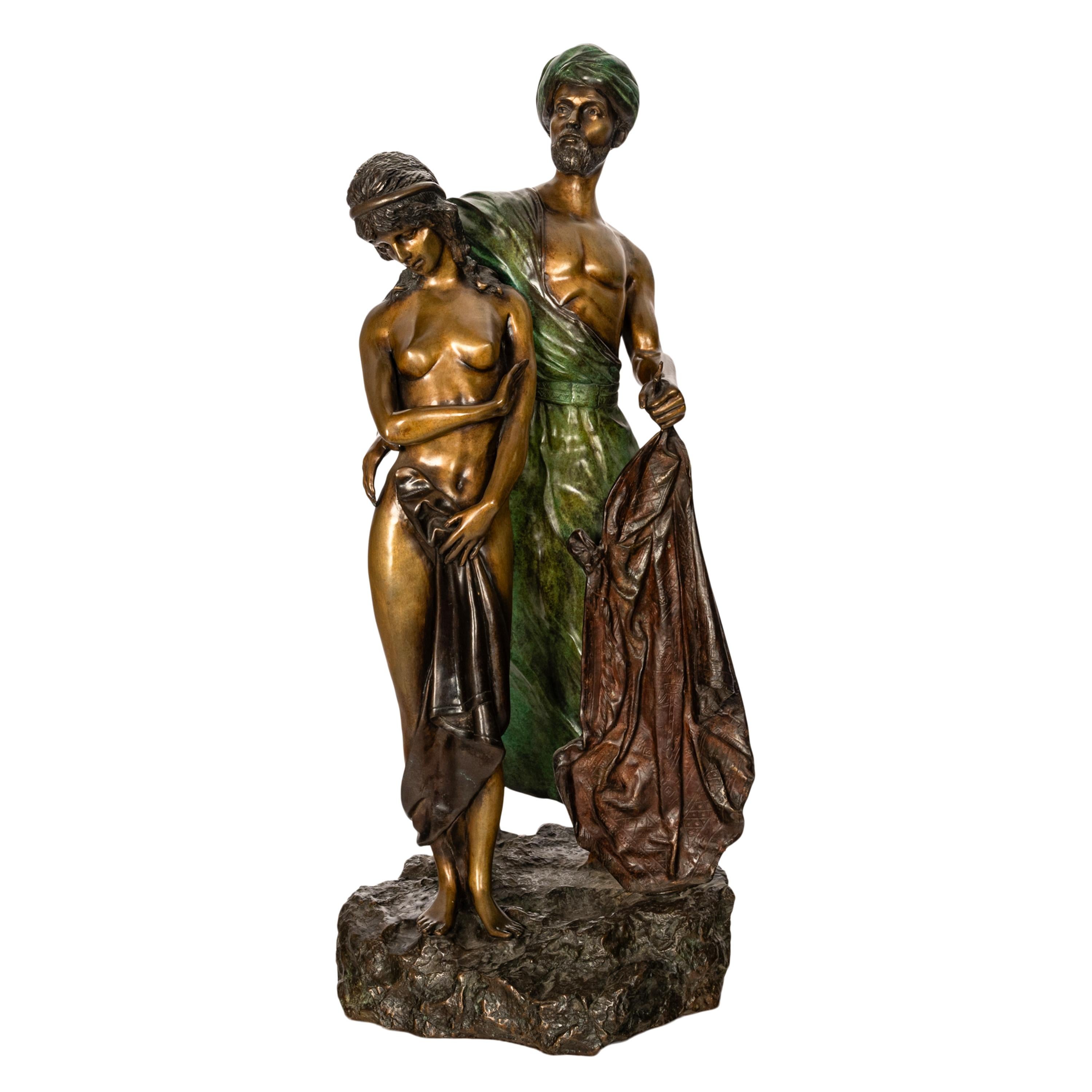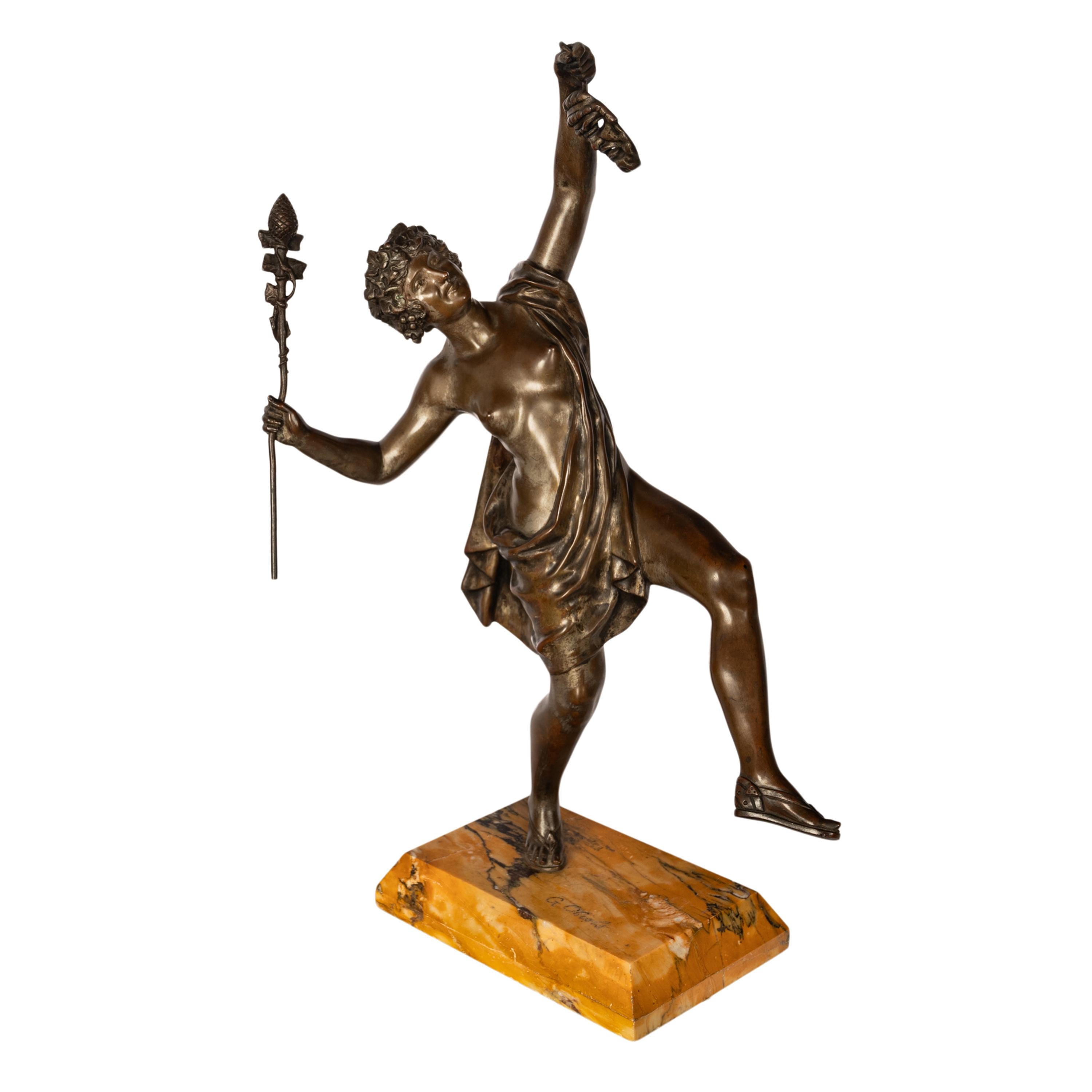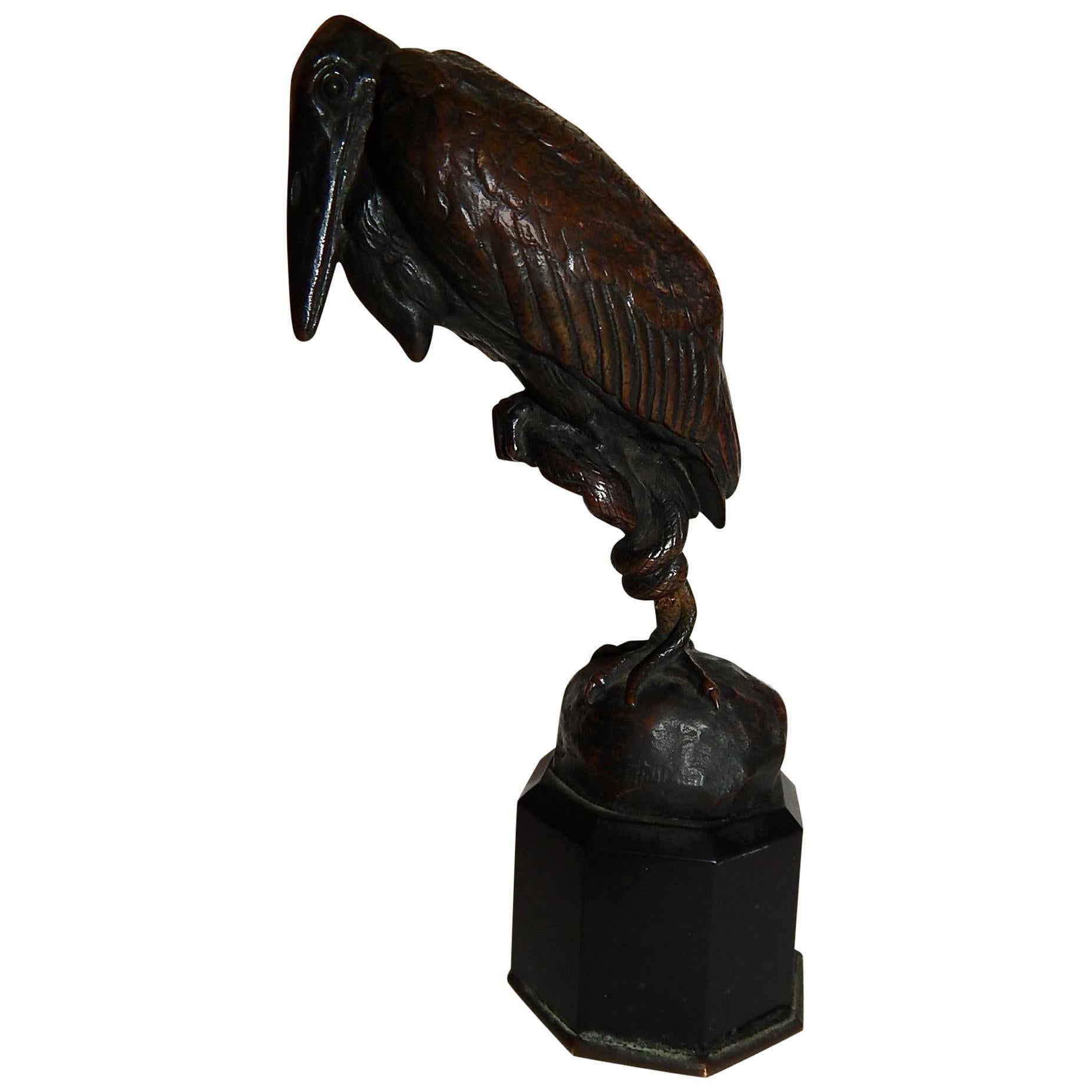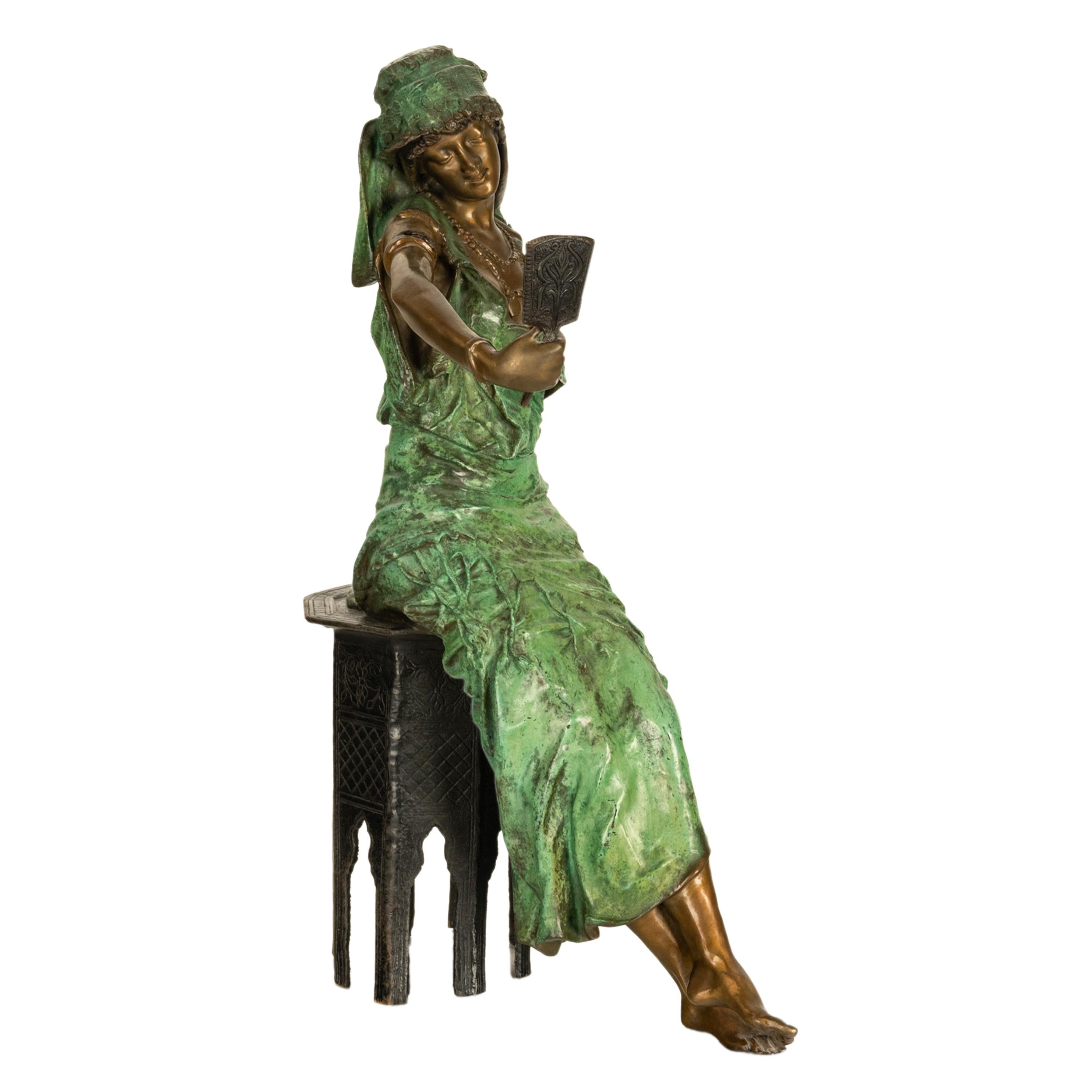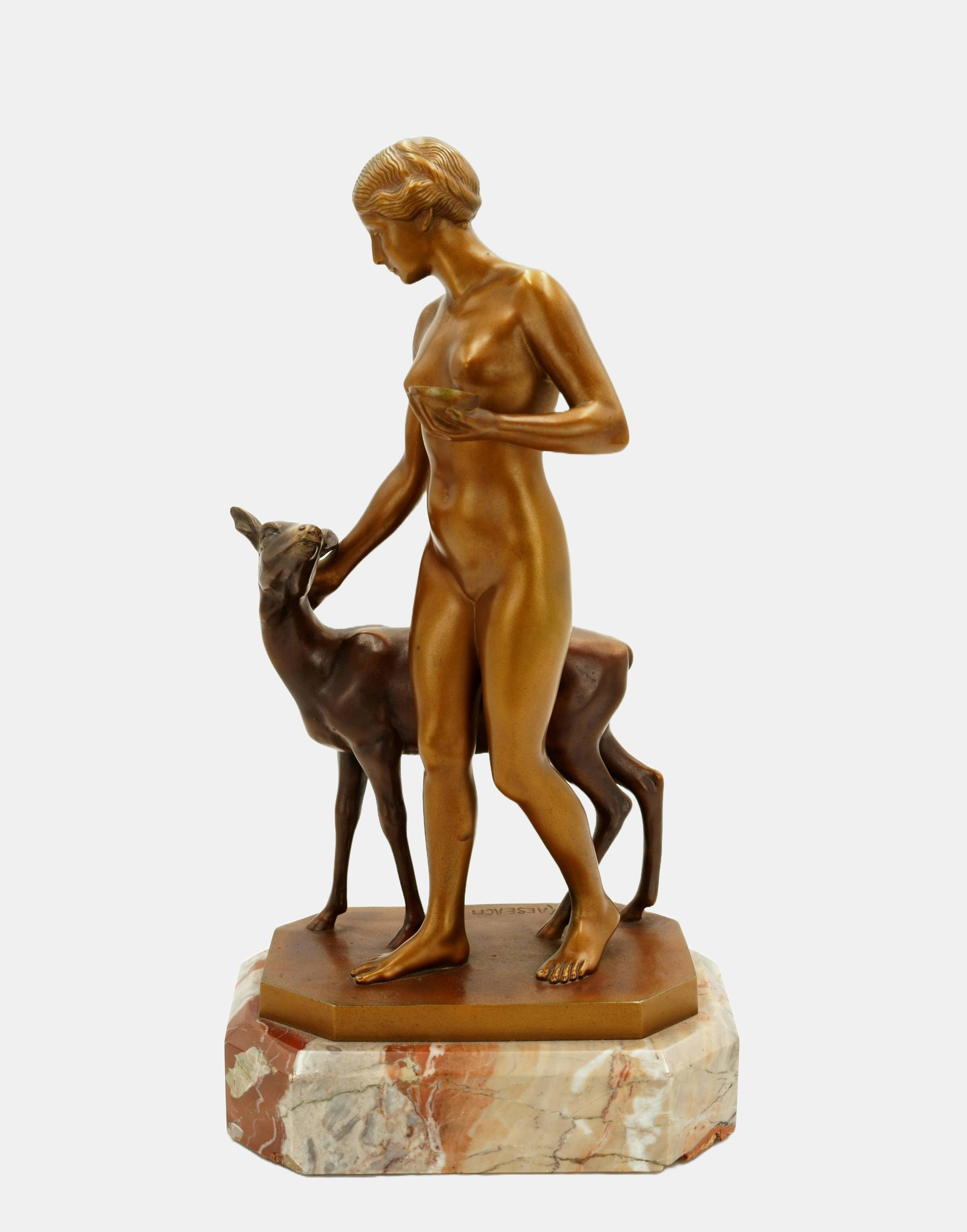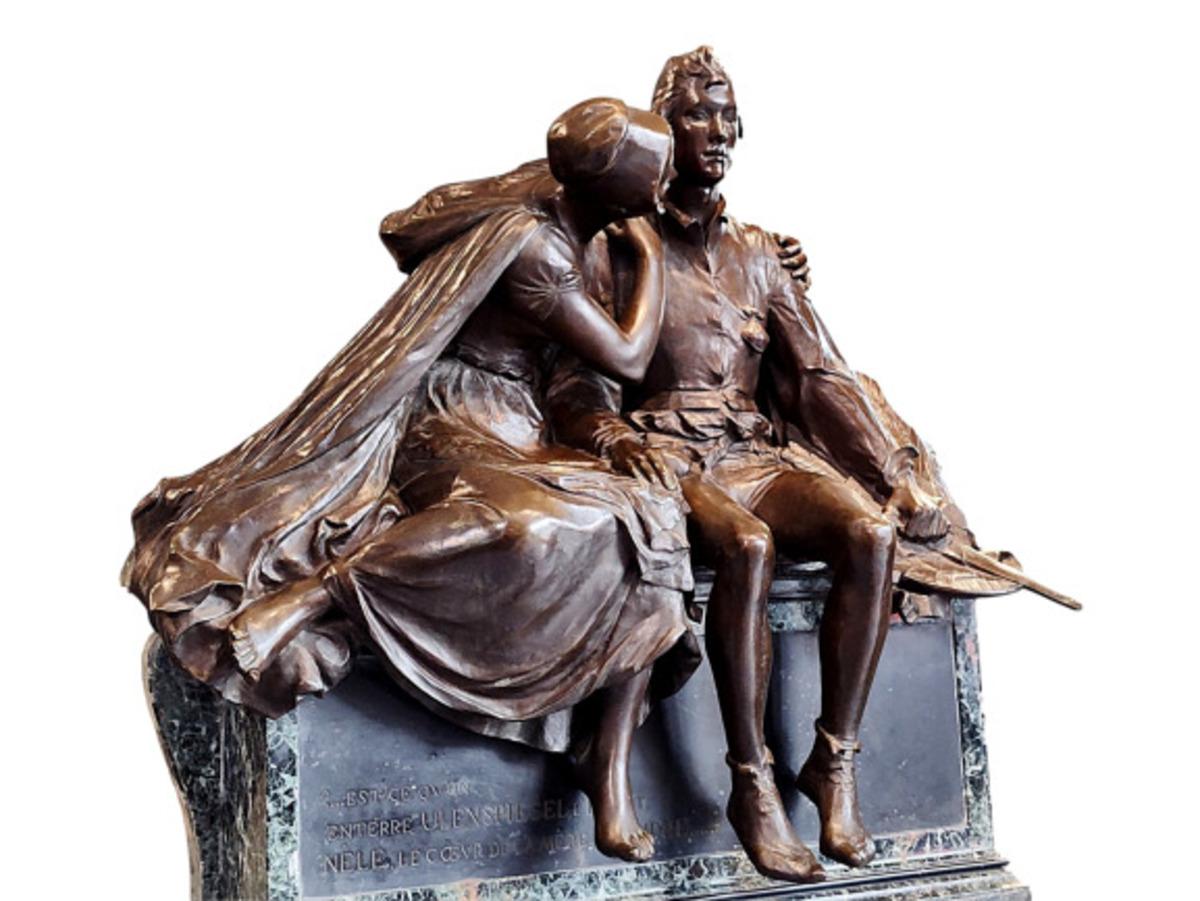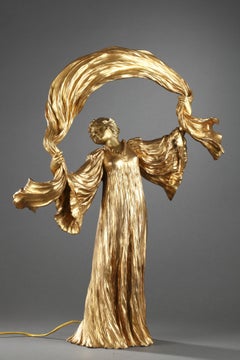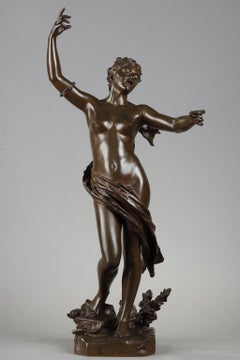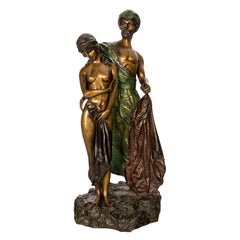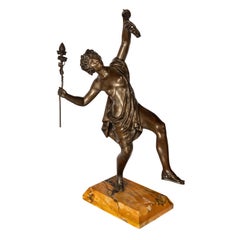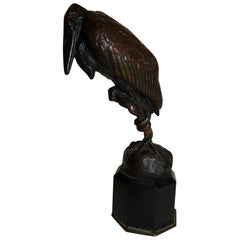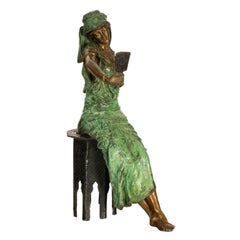Items Similar to Dancer with platform shoes
Want more images or videos?
Request additional images or videos from the seller
1 of 9
Agathon LéonardDancer with platform shoescirca 1905
circa 1905
About the Item
Dancer with platform shoes
by Agathon LÉONARD (1841–1923)
Sculpture made in gilded bronze
Signed on the dress "A. Léonard Sclp"
Cast by Susse Frères (with founder stamp)
Stamped with a foundry reference letter "M"
France
circa 1905
height 27,2 cm
width 9 cm
depth 6 cm
A similar model is reproduced in "Les bronzes du XIXe siècle", P. Kjellberg, Les éditions de l'amateur, 2005, page 460.
Biography:
Léonard Agathon Van Weydeveldt, said Agathon Léonard (1841-1923) was a sculptor of Belgian origin naturalized French. After studying art at the Lille Academy of Fine Arts and then at the École des Beaux-Arts in Paris, Agathon Léonard settled in Paris for a long time, where after having exhibited at the Salon of 1868, he joined the Society of French artists in 1887, then to the National Society of Fine Arts in 1897. Very involved in the artistic movement of the Art Nouveau style, he exhibited many pieces (medallions, bronze statuettes and ceramics) finely worked.
Following an order from the Manufacture Nationale de Sèvres, dating from 1898, Agathon Léonard exhibited at the Universal Exhibition of 1900 in Paris his famous table centerpiece "Game of the scarf" in porcelain biscuit, composed of fifteen statuettes representing dancers with pleated dresses reminiscent of Loïe Fuller's choreographies or Neo-Greek dancers with Delos tunics by Fortuny (two torch-lit dancers, dancer with a daisy, a piping dancer, a dancer raising her skirt, a cymbal dancer, a dancer singing, four dancers with a scarf).
The success of Agathon Léonard's group was breathtaking and the statuettes were sold in two sizes. In 1901, the artist presented the same figures, cast by the famous Parisian founder Susse Frères. Made in gilded bronze, chryselephantine (bronze for clothes, ivory for the flesh) or in silvered bronze, this new version confirmed the success of the statuettes, some of which were mounted in electric lamp, the bulb being precisely hidden in the scarf.
- Creator:Agathon Léonard (1841 - 1923, French)
- Creation Year:circa 1905
- Dimensions:Height: 10.71 in (27.2 cm)Width: 5.52 in (14 cm)Depth: 3.15 in (8 cm)
- Medium:
- Movement & Style:
- Period:
- Condition:
- Gallery Location:PARIS, FR
- Reference Number:Seller: N.76751stDibs: LU2514214730272
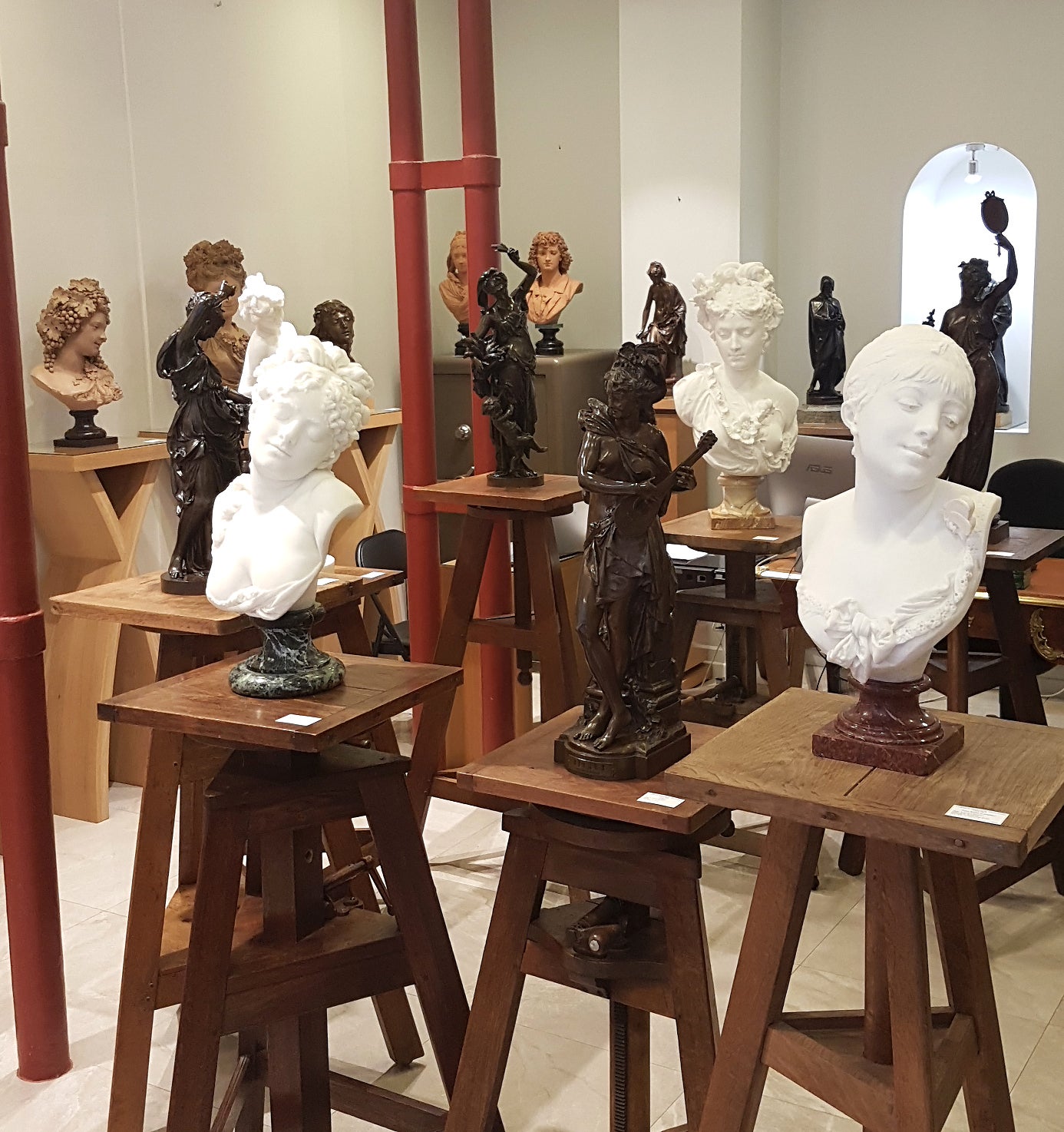
About the Seller
5.0
Recognized Seller
These prestigious sellers are industry leaders and represent the highest echelon for item quality and design.
Established in 1992
1stDibs seller since 2023
6 sales on 1stDibs
Typical response time: 15 hours
- ShippingRetrieving quote...Shipping from: PARIS, France
- Return Policy
Authenticity Guarantee
In the unlikely event there’s an issue with an item’s authenticity, contact us within 1 year for a full refund. DetailsMoney-Back Guarantee
If your item is not as described, is damaged in transit, or does not arrive, contact us within 7 days for a full refund. Details24-Hour Cancellation
You have a 24-hour grace period in which to reconsider your purchase, with no questions asked.Vetted Professional Sellers
Our world-class sellers must adhere to strict standards for service and quality, maintaining the integrity of our listings.Price-Match Guarantee
If you find that a seller listed the same item for a lower price elsewhere, we’ll match it.Trusted Global Delivery
Our best-in-class carrier network provides specialized shipping options worldwide, including custom delivery.More From This Seller
View All"Dancer with the scarf" lamp
By Agathon Léonard
Located in PARIS, FR
Agathon LÉONARD (1841–1923)
Lamp "Danseuse à L'Écharpe"
"Dancer with the scarf" lamp
A very rare sculpture forming a table lamp, made in gilded bronze
The scarf hides the light bulb
Signed on the side of the dress "A. Léonard Sclp"
Cast by Susse Frères (with founder stamp)
France
circa 1905
height 60 cm
A similar model is reproduced in "Les bronzes du XIXe siècle", P. Kjellberg, Les éditions de l'amateur, 2005, page 460.
Biography:
Léonard Agathon Van Weydeveldt, said Agathon Léonard (1841-1923) was a sculptor of Belgian origin naturalized French. After studying art at the Lille Academy of Fine Arts and then at the École des Beaux-Arts in Paris, Agathon Léonard settled in Paris for a long time, where after having exhibited at the Salon of 1868, he joined the Society of French artists in 1887, then to the National Society of Fine Arts in 1897. Very involved in the artistic movement of the Art Nouveau style, he exhibited many pieces (medallions, bronze statuettes and ceramics) finely worked.
Following an order from the Manufacture Nationale de Sèvres, dating from 1898, Agathon Léonard exhibited at the Universal Exhibition of 1900 in Paris his famous table centerpiece "Game of the scarf" in porcelain biscuit, composed of fifteen statuettes representing dancers with pleated dresses reminiscent of Loïe Fuller's choreographies or Neo-Greek dancers...
Category
Early 1900s Art Nouveau More Art
Materials
Bronze
The Song
By Félix Charpentier
Located in PARIS, FR
"The Song" by Félix Charpentier (1858-1924)
A very fine bronze sculpture with nuanced dark brown patina
Signed "Fx. Charpentier"
Cast by "E. Colin & Cie Paris"
France
around 1900
he...
Category
Early 1900s Art Nouveau Figurative Sculptures
Materials
Bronze
Hoop Player
By Jean-Léon Gérôme
Located in PARIS, FR
Hoop Player
by Jean-Léon GEROME (1824-1904)
Bronze with gilded patina
Signed on the base " JL.GEROME "
Cast by " Siot-Decauville Fondeur Paris " (with the foundry stamp)
Presented o...
Category
Early 20th Century Art Nouveau Figurative Sculptures
Materials
Bronze
Dressing Woman
Located in PARIS, FR
Dressing Woman
by Georges LAËTHIER (1875-1955)
Bronze sculpture with very nuanced greenish brown patina
Signed on the side of the base " G. Laethier "
old period cast
Presented on i...
Category
Early 1900s Art Nouveau Nude Sculptures
Materials
Bronze
Apple Dancer
By Jean-Léon Gérôme
Located in PARIS, FR
Apple Dancer
by Jean-Léon GEROME (1824-1904)
Bronze sculpture with a dual patina, brown and gilded
signed on the base "JL. GEROME"
cast by "Siot-Decauville Fondeur Paris" (foundry s...
Category
1890s Art Nouveau Figurative Sculptures
Materials
Bronze
The Mockers
By Victor Prouve
Located in PARIS, FR
The Mockers
by Victor PROUVE (1858-1943)
Rare bronze group with nuanced reddish brown patina
SIgned on the side of the base " V. Prouvé "
Cast by " Union de Maîtres Sculpteurs – édi...
Category
Early 1900s Art Nouveau Figurative Sculptures
Materials
Bronze
You May Also Like
Antique Orientalist Arab Slave Trader Female Nude Group Cold Painted Bronze 1910
By Franz Bergmann
Located in Portland, OR
A very large 24" (61cm) Franz Xavier Bergmann (1861-1936) cold painted bronze group statue, signed, Austria, circa 1910.
The bronze in the Orientalist manner & depicts a young slave ...
Category
1910s Art Nouveau Figurative Sculptures
Materials
Bronze
Antique Spanish Art Nouveau Bronze Neo-Classical Sculpture Statue Bacchante 1890
Located in Portland, OR
A very good antique Neo-Classical bronze of a Bacchante or Maenad, by Spanish sculptor Gustave Obiols Delgado (1858-1902). The sculpture circa 1890.
This large & very attractive, fin...
Category
1890s Art Nouveau Figurative Sculptures
Materials
Marble, Bronze
Barye Rare Bronze Sculpture, "Marabou and Snake Marabout Au Serpent"
By Antoine-Louis Barye
Located in Phoenix, AZ
Antoine-Louis Barye (1796-1875.) Bronze maribou stork and snake with rich brown patina, signed “Barye” on the embankment.
Antique edition cast marked F. Barbedienne Fondeur (caster.)...
Category
Early 20th Century Art Nouveau Figurative Sculptures
Materials
Bronze
Antique Italian Art Nouveau Coldpainted Bronze Orientalist Figure Arab Girl 1900
Located in Portland, OR
A very large & finely modeled antique Italian cold-painted Orientalist bronze of a young Arab girl, by the Italian sculptor Ferdinando de Luca, circa 1900.
Ferdinando de Luca (also k...
Category
Early 1900s Art Nouveau Figurative Sculptures
Materials
Bronze
Forest idyll / - Soulmate -
By Rudolf Kaesbach
Located in Berlin, DE
Rudolf Kaesbach (1873 Gladbach - 1955 Berlin), Forest idyll, around 1915. Bronze, gold and golden brown patina, with cast plinth, mounted on a marble base (5 cm high), total height 36 cm, dimensions of the bronze: 31 cm (height) x 17 cm (length) x 12 cm (width). Weight 4,6 kg, signed on the plinth "R.[udolf] KAESBACH".
- a few rubbed areas, overall in excellent condition for its age
- Soulmate -
The bronze sculpture depicts a young woman in an intimate exchange with a deer that accompanies her. The animal pauses to turn toward her, while the nude beauty slows her pace to look into the deer's eyes and tenderly caress it with her hand. The woman and the deer are in inner harmony. Even though her lips remain motionless, she speaks the language of the animal with which she is deeply connected.
The golden patina, which contrasts with the more naturalistic coloring of the deer, gives the young woman the appearance of a saint, even if she cannot be identified as such. At the same time, she evokes memories of Diana, the goddess of the hunt, or a nymph. But she lacks the ferocity. In her innocent naivety, she is more like a vestal virgin, who is not at home in the solitude of the forest. And yet, the young beauty, moving unclothed in the heart of nature, looks like a priestess with her hair tied up and a carefully carried bowl on her way to a sacred grove.
In order to open up the above-mentioned associations, Kaesbach deliberately designed the female figure in such a way that she cannot be identified as a specific person. He has created an allegory of natural femininity, characteristic of Art Nouveau, in which the deer is far more than a companion animal. It displays the same gracefulness as the young woman, and the inner resemblance between the two makes the deer appear as her other self. In animal terms, it embodies her inner being, which also gives the deer an allegorical character.
About the artist
Rudolf Kaesbach studied sculpture at the Hanau Academy and worked in a bronze foundry in Paris in 1900. In order to work as an independent artist, he opened a workshop in Düsseldorf, where he cast bronzes from models he designed. In 1902 he made his debut at the German National Art Exhibition in Düsseldorf. The following year Kaesbach went to the academy in Brussels. There he was inspired by contemporary Belgian sculpture, especially the work of Constantin Meunier. He moved to Berlin, where he opened a studio in the villa district of Grunewald and devoted himself to life-size marble sculptures and the design of bronzes. From 1911, he regularly presented his works at the major art exhibitions in Berlin, as well as in Düsseldorf and Malmö. Between 1936 and 1939, he also created models for the Rosenthal porcelain factory. From 1939 to 1944, Kaesbach was represented at the major German art exhibitions in Munich.
GERMAN VERSION
Rudolf Kaesbach (1873 Gladbach - 1955 Berlin), Waldidyll, um 1915. Gold und goldbraun patinierte Bronze mit gegossener Plinthe, auf einem Marmorsockel montiert (5 cm Höhe), Gesamthöhe 36 cm, Maße der Bronze: 31 cm (Höhe) x 17 cm (Länge) x 12 cm (Breite). Gewicht 4,6 kg, auf der Plinthe mit „R.[udolf] KAESBACH“ signiert.
- vereinzele beriebene Stellen, insgesamt in einem altersgemäß ausgezeichneten Zustand
- Seelenverwandtschaft -
Die Bronzeplastik veranschaulicht eine junge Frau im innigen Austausch mit einem sie begleitenden Reh. Das Tier hält inne, um sich zu ihr hochzuwenden, während die nackte Schönheit ihren Schritt verlangsamt, um dem Reh ebenfalls in die Augen zu schauen und es zärtlich mit der Hand zu liebkosen. Die Frau und das Reh sind in einem inneren Gleichklang. Auch wenn ihre Lippen unbewegt bleiben, spricht sie die Sprache des Tieres, mit dem sie auf eine tief empfundene Weise verbunden ist.
Die im Kontrast zur naturalistischeren Einfärbung des Rehs aufstrahlende goldfarbene Patina lässt die junge Frau wie eine Heilige erscheinen, auch wenn sich nicht als Heilige identifizierbar ist. Zugleich ruft sie Erinnerungen an die Jagdgöttin Diana oder eine Nymphe hervor. Dafür fehlt ihr allerdings die Wildheit. In ihrer unschuldigen Naivität gemahnt sie vielmehr an eine Vestalin, die freilich nicht in der Waldeinsamkeit zu Hause ist. Und doch wirkt die sich unbekleidet im Herzen der Natur bewegende junge Schönheit wie eine Priesterin, die sich mit hochgebundenem Haar und der vorsichtig getragenen Schale und dem Wege zu einem Heiligen Hain befindet.
Um die gennannten Assoziationen zu eröffnen, hat Kaesbach die Frauenfigur bewusst so gestaltet, dass sie nicht als konkrete Person identifizierbar ist. Damit hat er eine für den Jugendstil charakteristische Allegorie natürlicher Weiblichkeit geschaffen, bei der das Reh weit mehr als ein Begleittier ist. Es weist dieselbe grazile Anmut wie die junge Frau auf und der innere Gleichklag der beiden lässt das Reh als ihr anderen Ich erscheinen. Es verkörpert – ins Animalische übertragen - ihr inneres Wesen, wodurch auch dem Reh ein allegorischer Charakter zukommt.
zum Künstler
Rudolf Kaesbach studierte an der Akademie Hanau Bildhauerei und war im Jahr 1900 in einer Pariser Bronzegießerei tätig. Um sich als eigenständiger Künstler betätigen zu können, eröffnete er in Düsseldorf eine Werkstatt, in der er Bronzen nach selbstentworfenen Modellen goss. 1902 debütierte er auf der Deutschen Nationalen Kunstaustellung in Düsseldorf. Im Folgejahr ging Kaesbach an die Akademie nach Brüssel. Dort wurde er von der zeitgenössischen belgischen Bildhauerei, insbesondere vom Werk Constantin Meuniers, inspiriert. Zurückgekehrt zog er nach Berlin, wo er im Villenviertel Grunewald ein Atelier eröffnete und sich neben dem Entwurf für Bronzen der lebensgroßen Marmorbildhauerei widmete. Ab 1911 präsentierte er seine Werke regelmäßig auf den Großen Berliner Kunstausstellungen, aber auch in Düsseldorf und Malmö. Zwischen 1936 und 1939 fertigte er zudem Modelle für die Porzellan-Manufaktur Rosenthal an. Von 1939 bis 1944 war...
Category
1910s Jugendstil Nude Sculptures
Materials
Bronze
Thyl Ulenspiegel et Nele – Reduction of the Monument to Charles De Coster
Located in Gent, VOV
Charles Samuel – Thyl Ulenspiegel and Nele (after the Monument to Charles De Coster, 1894) Bronze, marble base, 66 x 61 x 27 cm Cast by Petermann, Brussels A moment of intimacy and d...
Category
20th Century Art Nouveau Figurative Sculptures
Materials
Marble, Bronze
Recently Viewed
View AllMore Ways To Browse
Used Platform Shoes
Antique Shoes
Gilded Bronze Signed
Porcelain Dancer
Medallion Sculpture
Statuettes Gold
New Size 6 Shoes
Two Dancers Bronze
Sculpture Biscuit
Skirt Sculpture
Antique Lille
Antique French Shoes
Belgium Shoes
Biscuit Porcelain Sculptures
Bronze And Ivory Sculpture
2005 Skirt
Antique Shoe Sign
Greece Style Dress
